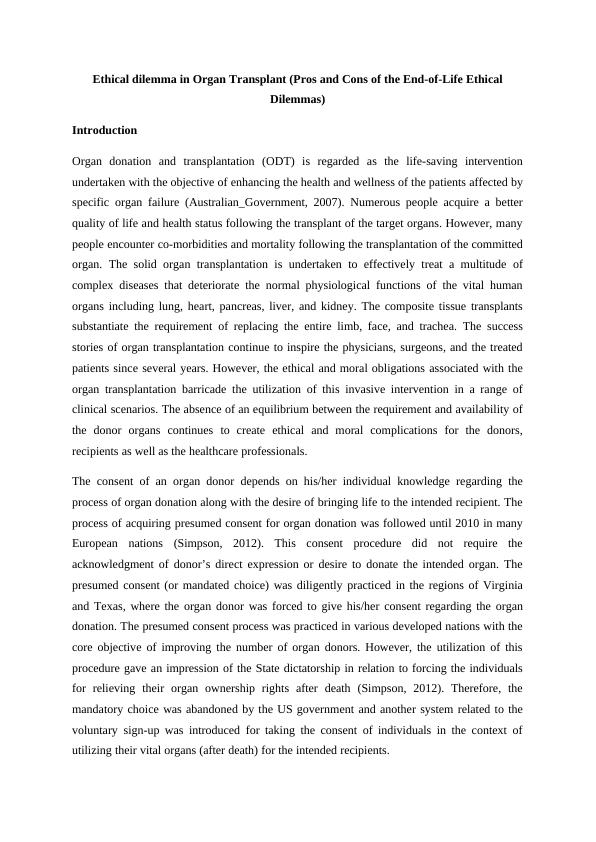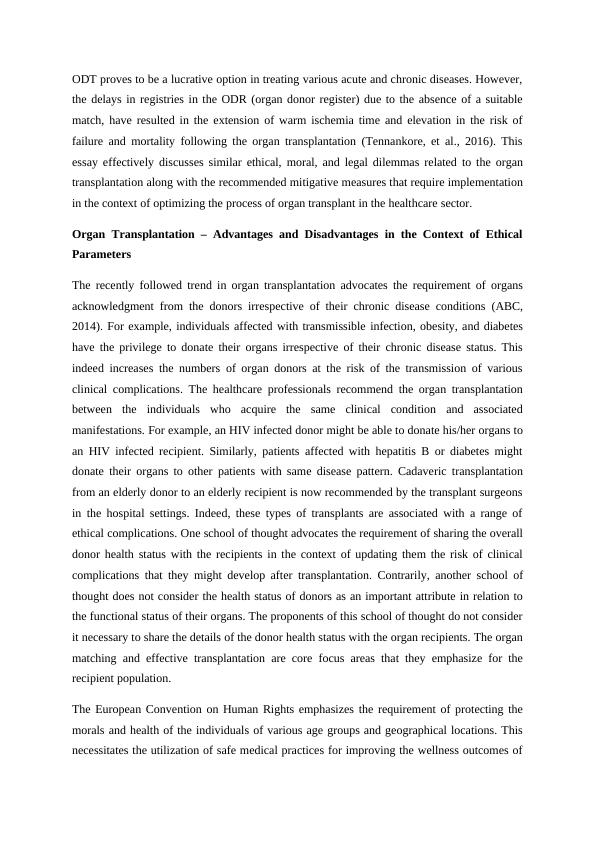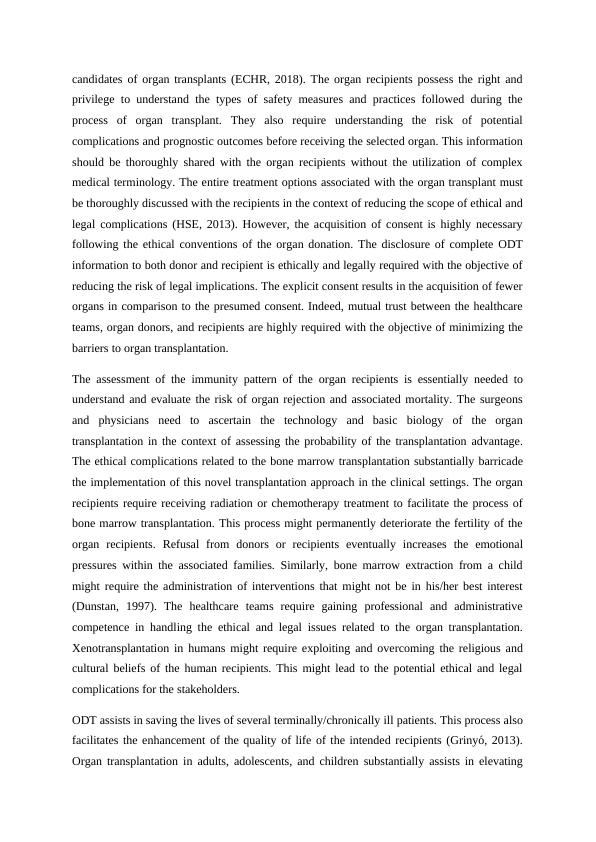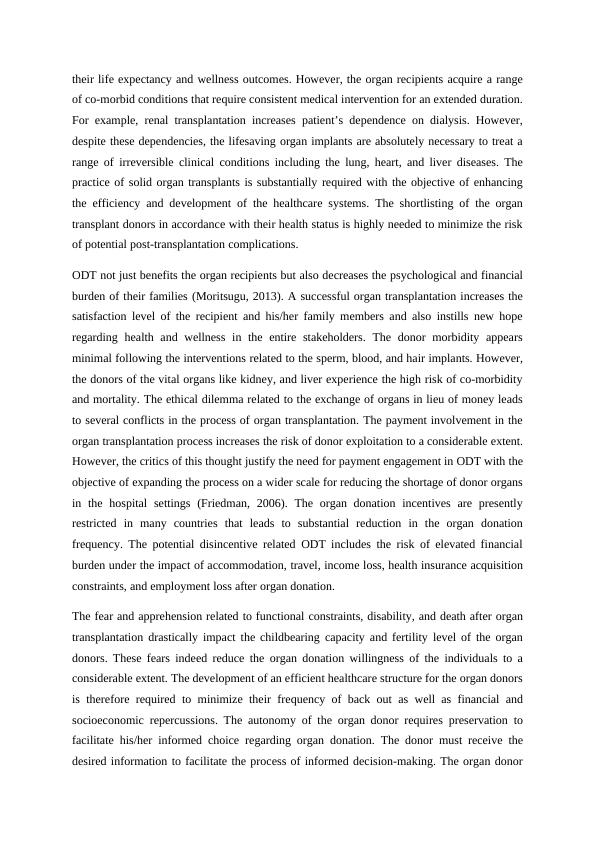Ethical dilemma in Organ Transplant Assignment PDF
Added on 2021-06-15
11 Pages3909 Words34 Views
Ethical dilemma in Organ Transplant (Pros and Cons of the End-of-Life EthicalDilemmas)IntroductionOrgan donation and transplantation (ODT) is regarded as the life-saving interventionundertaken with the objective of enhancing the health and wellness of the patients affected byspecific organ failure (Australian_Government, 2007). Numerous people acquire a betterquality of life and health status following the transplant of the target organs. However, manypeople encounter co-morbidities and mortality following the transplantation of the committedorgan. The solid organ transplantation is undertaken to effectively treat a multitude ofcomplex diseases that deteriorate the normal physiological functions of the vital humanorgans including lung, heart, pancreas, liver, and kidney. The composite tissue transplantssubstantiate the requirement of replacing the entire limb, face, and trachea. The successstories of organ transplantation continue to inspire the physicians, surgeons, and the treatedpatients since several years. However, the ethical and moral obligations associated with theorgan transplantation barricade the utilization of this invasive intervention in a range ofclinical scenarios. The absence of an equilibrium between the requirement and availability ofthe donor organs continues to create ethical and moral complications for the donors,recipients as well as the healthcare professionals. The consent of an organ donor depends on his/her individual knowledge regarding theprocess of organ donation along with the desire of bringing life to the intended recipient. Theprocess of acquiring presumed consent for organ donation was followed until 2010 in manyEuropean nations (Simpson, 2012). This consent procedure did not require theacknowledgment of donor’s direct expression or desire to donate the intended organ. Thepresumed consent (or mandated choice) was diligently practiced in the regions of Virginiaand Texas, where the organ donor was forced to give his/her consent regarding the organdonation. The presumed consent process was practiced in various developed nations with thecore objective of improving the number of organ donors. However, the utilization of thisprocedure gave an impression of the State dictatorship in relation to forcing the individualsfor relieving their organ ownership rights after death (Simpson, 2012). Therefore, themandatory choice was abandoned by the US government and another system related to thevoluntary sign-up was introduced for taking the consent of individuals in the context ofutilizing their vital organs (after death) for the intended recipients.

ODT proves to be a lucrative option in treating various acute and chronic diseases. However,the delays in registries in the ODR (organ donor register) due to the absence of a suitablematch, have resulted in the extension of warm ischemia time and elevation in the risk offailure and mortality following the organ transplantation (Tennankore, et al., 2016). Thisessay effectively discusses similar ethical, moral, and legal dilemmas related to the organtransplantation along with the recommended mitigative measures that require implementationin the context of optimizing the process of organ transplant in the healthcare sector. Organ Transplantation – Advantages and Disadvantages in the Context of EthicalParametersThe recently followed trend in organ transplantation advocates the requirement of organsacknowledgment from the donors irrespective of their chronic disease conditions (ABC,2014). For example, individuals affected with transmissible infection, obesity, and diabeteshave the privilege to donate their organs irrespective of their chronic disease status. Thisindeed increases the numbers of organ donors at the risk of the transmission of variousclinical complications. The healthcare professionals recommend the organ transplantationbetween the individuals who acquire the same clinical condition and associatedmanifestations. For example, an HIV infected donor might be able to donate his/her organs toan HIV infected recipient. Similarly, patients affected with hepatitis B or diabetes mightdonate their organs to other patients with same disease pattern. Cadaveric transplantationfrom an elderly donor to an elderly recipient is now recommended by the transplant surgeonsin the hospital settings. Indeed, these types of transplants are associated with a range ofethical complications. One school of thought advocates the requirement of sharing the overalldonor health status with the recipients in the context of updating them the risk of clinicalcomplications that they might develop after transplantation. Contrarily, another school ofthought does not consider the health status of donors as an important attribute in relation tothe functional status of their organs. The proponents of this school of thought do not considerit necessary to share the details of the donor health status with the organ recipients. The organmatching and effective transplantation are core focus areas that they emphasize for therecipient population. The European Convention on Human Rights emphasizes the requirement of protecting themorals and health of the individuals of various age groups and geographical locations. Thisnecessitates the utilization of safe medical practices for improving the wellness outcomes of

candidates of organ transplants (ECHR, 2018). The organ recipients possess the right andprivilege to understand the types of safety measures and practices followed during theprocess of organ transplant. They also require understanding the risk of potentialcomplications and prognostic outcomes before receiving the selected organ. This informationshould be thoroughly shared with the organ recipients without the utilization of complexmedical terminology. The entire treatment options associated with the organ transplant mustbe thoroughly discussed with the recipients in the context of reducing the scope of ethical andlegal complications (HSE, 2013). However, the acquisition of consent is highly necessaryfollowing the ethical conventions of the organ donation. The disclosure of complete ODTinformation to both donor and recipient is ethically and legally required with the objective ofreducing the risk of legal implications. The explicit consent results in the acquisition of fewerorgans in comparison to the presumed consent. Indeed, mutual trust between the healthcareteams, organ donors, and recipients are highly required with the objective of minimizing thebarriers to organ transplantation. The assessment of the immunity pattern of the organ recipients is essentially needed tounderstand and evaluate the risk of organ rejection and associated mortality. The surgeonsand physicians need to ascertain the technology and basic biology of the organtransplantation in the context of assessing the probability of the transplantation advantage.The ethical complications related to the bone marrow transplantation substantially barricadethe implementation of this novel transplantation approach in the clinical settings. The organrecipients require receiving radiation or chemotherapy treatment to facilitate the process ofbone marrow transplantation. This process might permanently deteriorate the fertility of theorgan recipients. Refusal from donors or recipients eventually increases the emotionalpressures within the associated families. Similarly, bone marrow extraction from a childmight require the administration of interventions that might not be in his/her best interest(Dunstan, 1997). The healthcare teams require gaining professional and administrativecompetence in handling the ethical and legal issues related to the organ transplantation.Xenotransplantation in humans might require exploiting and overcoming the religious andcultural beliefs of the human recipients. This might lead to the potential ethical and legalcomplications for the stakeholders. ODT assists in saving the lives of several terminally/chronically ill patients. This process alsofacilitates the enhancement of the quality of life of the intended recipients (Grinyó, 2013).Organ transplantation in adults, adolescents, and children substantially assists in elevating

their life expectancy and wellness outcomes. However, the organ recipients acquire a rangeof co-morbid conditions that require consistent medical intervention for an extended duration.For example, renal transplantation increases patient’s dependence on dialysis. However,despite these dependencies, the lifesaving organ implants are absolutely necessary to treat arange of irreversible clinical conditions including the lung, heart, and liver diseases. Thepractice of solid organ transplants is substantially required with the objective of enhancingthe efficiency and development of the healthcare systems. The shortlisting of the organtransplant donors in accordance with their health status is highly needed to minimize the riskof potential post-transplantation complications. ODT not just benefits the organ recipients but also decreases the psychological and financialburden of their families (Moritsugu, 2013). A successful organ transplantation increases thesatisfaction level of the recipient and his/her family members and also instills new hoperegarding health and wellness in the entire stakeholders. The donor morbidity appearsminimal following the interventions related to the sperm, blood, and hair implants. However,the donors of the vital organs like kidney, and liver experience the high risk of co-morbidityand mortality. The ethical dilemma related to the exchange of organs in lieu of money leadsto several conflicts in the process of organ transplantation. The payment involvement in theorgan transplantation process increases the risk of donor exploitation to a considerable extent.However, the critics of this thought justify the need for payment engagement in ODT with theobjective of expanding the process on a wider scale for reducing the shortage of donor organsin the hospital settings (Friedman, 2006). The organ donation incentives are presentlyrestricted in many countries that leads to substantial reduction in the organ donationfrequency. The potential disincentive related ODT includes the risk of elevated financialburden under the impact of accommodation, travel, income loss, health insurance acquisitionconstraints, and employment loss after organ donation. The fear and apprehension related to functional constraints, disability, and death after organtransplantation drastically impact the childbearing capacity and fertility level of the organdonors. These fears indeed reduce the organ donation willingness of the individuals to aconsiderable extent. The development of an efficient healthcare structure for the organ donorsis therefore required to minimize their frequency of back out as well as financial andsocioeconomic repercussions. The autonomy of the organ donor requires preservation tofacilitate his/her informed choice regarding organ donation. The donor must receive thedesired information to facilitate the process of informed decision-making. The organ donor

End of preview
Want to access all the pages? Upload your documents or become a member.
Related Documents
Organ Retrieval on Deceased Persons Despite Objectionslg...
|7
|1966
|48
Legalization of Organ Sales: Benefits Outweigh Riskslg...
|8
|2198
|465